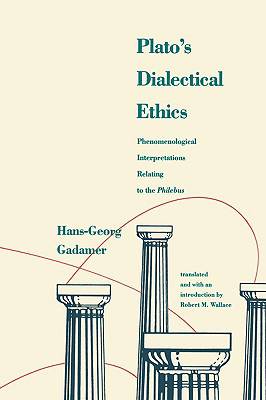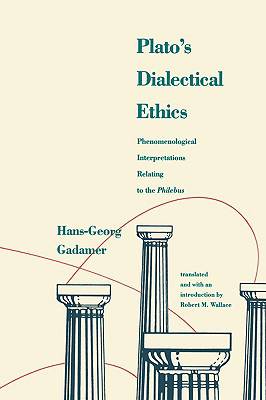
Door een staking bij bpost kan je online bestelling op dit moment iets langer onderweg zijn dan voorzien. Dringend iets nodig? Onze winkels ontvangen jou met open armen!
- Afhalen na 1 uur in een winkel met voorraad
- Gratis thuislevering in België vanaf € 30
- Ruim aanbod met 7 miljoen producten
Door een staking bij bpost kan je online bestelling op dit moment iets langer onderweg zijn dan voorzien. Dringend iets nodig? Onze winkels ontvangen jou met open armen!
- Afhalen na 1 uur in een winkel met voorraad
- Gratis thuislevering in België vanaf € 30
- Ruim aanbod met 7 miljoen producten
Zoeken
Plato's Dialectical Ethics
Phenomenological Interpretations Relating to the Philebus
Hans-Georg Gadamer
Paperback | Engels
€ 64,45
+ 128 punten
Omschrijving
Plato's Dialectical Ethics, Gadamer's earliest work, has now been translated into English for the first time. This classic book, published in 1931 and reprinted in 1967 and 1982, is still important today. It is one of the most extensive and imaginative interpretations of Plato's Philebus and an ideal introduction to Gadamer's thinking. It shows how his influential hermeneutics emerged from the application of his teacher Martin Heidegger's phenomenological method to classical texts and problems.
The work consists of two chapters. The first, which puts Socratic/Platonic dialectics and ethics in the context of Gadamer's thinking about how we come to shared understanding through conversation, helps to clarify the intentions and trajectory of all Gadamer's subsequent work.
The second chapter, on the Philebus, will interest everyone who is concerned with the connection between Plato's discussions of ethics and those of Aristotle, and with the substantive issues of the relation between pleasure and reason that Plato explores and Gadamer interprets. This edition includes a new and useful introduction by the translator, Robert M. Wallace.
The work consists of two chapters. The first, which puts Socratic/Platonic dialectics and ethics in the context of Gadamer's thinking about how we come to shared understanding through conversation, helps to clarify the intentions and trajectory of all Gadamer's subsequent work.
The second chapter, on the Philebus, will interest everyone who is concerned with the connection between Plato's discussions of ethics and those of Aristotle, and with the substantive issues of the relation between pleasure and reason that Plato explores and Gadamer interprets. This edition includes a new and useful introduction by the translator, Robert M. Wallace.
Specificaties
Betrokkenen
- Auteur(s):
- Uitgeverij:
Inhoud
- Aantal bladzijden:
- 240
- Taal:
- Engels
Eigenschappen
- Productcode (EAN):
- 9780300159745
- Verschijningsdatum:
- 2/03/2009
- Uitvoering:
- Paperback
- Formaat:
- Trade paperback (VS)
- Afmetingen:
- 152 mm x 229 mm
- Gewicht:
- 412 g

Alleen bij Standaard Boekhandel
+ 128 punten op je klantenkaart van Standaard Boekhandel
Beoordelingen
We publiceren alleen reviews die voldoen aan de voorwaarden voor reviews. Bekijk onze voorwaarden voor reviews.











